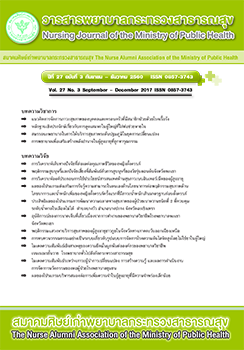Nursing Care for Empowerment of Abused Older Persons
Main Article Content
Abstract
Abuse or violence in older people is one of the significant problems in aging society and this problem will increasingly more intense in Thailand as it is becoming an aging society. It is found that abusers are often close relatives either living in the same family or other persons in the society. Physical and psychological assaults, neglect, and financial or material abuse are common abusive behaviors towards older persons. This affects the health status and quality of life of older persons.
Nursing care that applies empowerment concepts is an important intervention to heal physical, psychological, emotional, social, and the spiritual well-being of the elderly who have been abused. The focus is to use the potential of the elderly to take care of and promote their own health. Additionally, it can help older persons to discover their efficacy and abilities. It also makes older persons believe in taking care of themselves, including enhancing the perception towards their power and control of related factors. It assists them to independently make decisions in employing several means to take care of themselves. This may help older persons build self-protection and prevention from the effects of abuse. As a result, they can live happy and successful lives.
Article Details
บทความและรายงานวิจัยในวารสารพยาบาลกระทรวงสาธารณสุข เป็นความคิดเห็นของ ผู้เขียน มิใช่ของคณะผู้จัดทำ และมิใช่ความรับผิดชอบของสมาคมศิษย์เก่าพยาบาลกระทรวงสาธารณสุข ซึ่งสามารถนำไปอ้างอิงได้
References
&Publishing; 2015.
2. Pompugde C. Aging society in Thailand. [Internet]. 2013.[cited 2016 June 6]. Availablefrom:http://library.senate.go.th/document/Ext6078/6078440_0002.PDF (in Thai).
3. Sritanyaratana W, Dumrikanlert L.(Eds). Knowledge management practices andsynthesis of health promoting hospital : The practice of elderly services. Nonthaburi: Sahamit Phrinting and Publishing; 2010. (in Thai).
4. World Health Organization (WHO).Elder abuse. [Internet]. 2016. [cited 2016 October 5].
Availablefrom :http://www.who.int/mediacentre/factsheets /fs357/en/
5. Chompunud S, Charoenyooth C, Palmer MH, Pongthavornkamol K, Vorapongsathorn T, Jitapunkul S. Prevalence associated factors and predictors of elder abuse in Thailand. Pacific Rim International Journal of Nursing
Research 2010;14(4): 283-296. (in Thai).
6. Kespichayawattana J, Wivatvanit S. Elderly mistreatment among Thai elderly :The review state of science and current situation.Foundation of Thai Gerontology Research and Development institute.[Internet]. 2009. [cited 2016
November 6 ]. Available from: http://thaitgri. org/?p=37285 (in Thai).
7. Sirisup K. Preliminary report: Psychological experiences of the abused elderly. Journal of Mental Health of Thailand 2013;21(1):21-30. (in Thai).
8. Wichawut C, Chayovan N, Wongchai Y, Intara sombat P, Tummanawut N, Tunmanwut N.(Eds).
Review and synthesis of theknowledge on Thai elderly 2002-2007. Foundation of Thai Gerontology Research and Development institute. Bangkok: Q.P.;2010. (in Thai).
9. Budd J. Prevention of elder abuse project and the respect for seniors campaign. [Internet].2012.
[cited 2016 October 5 ]. Available from: http://www.respectforseniors.org/pdf/Primary%20
Interventions%20Literature%20 Review.pdf
10. Elder Abuse Prevention Unit. A guide for elder abuse protocols. Queensland Government,
Department of Communities.[Internet]. 2012.[cited 2016 October 12] Available from:http://www.eapu.com.au/uploads/EAPU_general_resources/EA_Protocols_FEB_2012-EAPU.pdf
11. Wolf RS, Bennett G, Daichman, L. Abuse of older people.In BL Green, MJ Friedman, J de Jong, SD Solomon, TM Keane, JA Fairbank, B Donelan, E Frey-Wouters (Eds.), Trauma interventions in war and peace. (pp. 105-128).
New York: Kluwer Academic; 2003.
12. Srisatidnarakul B. Leadership and strategic management in nursing organization for the 21st century. Bangkok: Chulalongkorn University;2007.(in Thai).
13. Leyshon S. Empowering practitioners: an unrealistic expectation of nurseeducation. Journal of Advanced Nursing 2002;40(4):466-474.
14. Shearer NB, Fleury J, Ward KA, O’Brien AM. Empowermentinterventions for older adults. Western Journal of Nursing Research2012;34(1):24–51.doi : 10.1277/019394591037788
15. Gibson CH. A study of empowerment in mothers of chronically ill children.(Doctoral dissertation). Boston College: Boston ; 1993.
16. Yodpet S. Social welfare for older persons:concept and method for social work practice. 2nd ed. Bangkok: Misterkopy; 2006. (in Thai).
17. Aujoulat I, d’ Hoore W, Deccache A. Patient empowerment in theory and practice: Polysemy or cacophony. Patient Education and Counseling 2007;66(1): 13-20.
18. Carney MT, Kahan FS, Paris BEBE. Elder abuse: Is every bruise a sign of abuse?.The Mount Sinai Journal of Medicine 2003;70(2):69-74.
19. Kuha A. Psychology for daily life. 2nd ed. Pattani: Mittraphap ; 2013. (in Thai).
20. Sathirapanya C. Mental health. 2nd ed. Shongka: Umsilp-advertise ; 2009. (in Thai).
21. Beales S. Empowerment and older people:enhancing capabilities in an ageing world. Paperpresented at the Expert Group Meeting on Promoting people’s empowerment in achieving poverty eradication, social integration and productive and decent work for all 2012 September 10-12 ;UN Headquarters, New York. [Internet]. 2012. [cited 2016 October 5 ]. Available from: www.un.org/esa/socdev/egms/docs/2012/SylviaBeales.pdf

